| Listing 1 - 5 of 5 |
Sort by
|
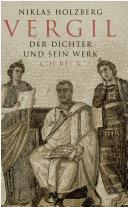
ISBN: 3406535887 9783406535888 Year: 2006 Publisher: München Beck
Abstract | Keywords | Export | Availability | Bookmark
 Loading...
Loading...Choose an application
- Reference Manager
- EndNote
- RefWorks (Direct export to RefWorks)
Virgil --- Criticism and interpretation --- Vergil --- Virgile --- Virgilio Máron, Publio --- Virgilius Maro, Publius --- Vergili Maronis, Publius --- Criticism and interpretation. --- Vergilius Maro, Publius --- Virgilius Maro, Publius, --- Virgilio Marone, P., --- Vergilīĭ, --- Virgile, --- Vergílio, --- Wergiliusz, --- Vergilīĭ Maron, P. --- Vergilīĭ Maron, Publīĭ, --- Verhiliĭ Maron, P., --- Vergil, --- Virgilio, --- Virgilīĭ, --- Virgilius Maro, P., --- Virgil Maro, P., --- ווירגיל, --- וירגיליוס, --- ורגיליוס, --- מרו, פובליוס ורגיליוס, --- فرجيل, --- Pseudo-Virgil, --- Pseudo Virgilio, --- Virgilio Marón, Publio, --- Bhārjila, --- Vergilius Maro, P. --- Vergilius --- Virgilio Marone, P. --- Vergilīĭ --- Vergílio --- Wergiliusz --- Vergilīĭ Maron, Publīĭ --- Verhiliĭ Maron, P. --- Virgilio --- Virgilius Maro, P. --- Virgil Maro, P. --- Pseudo-Virgil --- Pseudo Virgilio --- Virgilio Marón, Publio --- Bhārjila --- Marone, Publio Virgilio --- Virgil - Criticism and interpretation
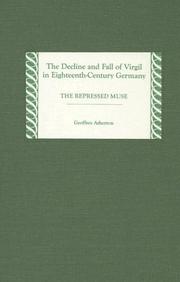
ISBN: 1281949299 9786611949297 1571136738 1571133062 Year: 2006 Publisher: Rochester, NY : Camden House,
Abstract | Keywords | Export | Availability | Bookmark
 Loading...
Loading...Choose an application
- Reference Manager
- EndNote
- RefWorks (Direct export to RefWorks)
In the early modern period, the culture of Rome, with Virgil as its greatest figure, was the model for emulation. The age of Louis XIV compared itself to the Augustan age, and Dryden hailed Virgil as 'my Divine Master.' But in 18th-century Europe, a general shift occurred in favor of Greece, a trend that was most pronounced in Germany. Winckelmann, the spokesman for philhellenism, extolled Greek art and dismissed all Roman art as derivative and Virgil as second rate and incapable of understanding true beauty. Yet he nonetheless remained indebted to Virgil for his view of Greek art, although he failed to recognize it. The export of Winckelmann's new view of Virgil and more generally Roman culture - shared to varying extents by Lessing, Herder, Goethe, and the brothers Schlegel - to the rest of Europe in the 19th century, particularly to the English-speaking world via Coleridge and Matthew Arnold] soon made it the reigning dogma: indeed it formed the point of departure for Virgil scholarship in the 20th century. This, however, did not prevent German poets from using Virgil, although neither they nor later scholars called attention to it. Virgil became a repressed muse, and has a continued, unexamined presence in the epic and idyll of Klopstock, Wieland, Goethe, and Novalis. Geoffrey Atherton's comparative investigation of the relation of modernity to antiquity through Virgil and his twofold reception represents a new perspective on this issue. Geoffrey Atherton is assistant professor in the Department of German Studies at Connecticut College.
German literature --- Aesthetics, German --- History and criticism. --- Virgil --- Vergilius Maro, P. --- Vergilius Maro, Publius --- Vergilius --- Vergil --- Virgile --- Virgilio Máron, Publio --- Virgilius Maro, Publius --- Vergili Maronis, Publius --- Virgilio Marone, P. --- Vergilīĭ --- Vergílio --- Wergiliusz --- Vergilīĭ Maron, P. --- Vergilīĭ Maron, Publīĭ --- Verhiliĭ Maron, P. --- Virgilio --- Virgilīĭ, --- Virgilius Maro, P. --- Virgil Maro, P. --- ווירגיל, --- וירגיליוס, --- ורגיליוס, --- מרו, פובליוס ורגיליוס, --- فرجيل, --- Pseudo-Virgil --- Pseudo Virgilio --- Virgilio Marón, Publio --- Bhārjila --- Influence. --- Appreciation --- Marone, Publio Virgilio
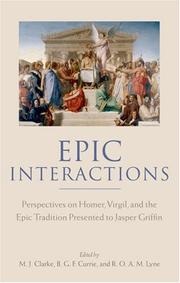
ISBN: 9780199276301 0199276307 0191706019 0191534781 1435607260 Year: 2006 Publisher: Oxford Oxford university press
Abstract | Keywords | Export | Availability | Bookmark
 Loading...
Loading...Choose an application
- Reference Manager
- EndNote
- RefWorks (Direct export to RefWorks)
This collection of essays, written by former pupils, celebrates the career of Jasper Griffin, one of the foremost modern scholars of classical epic. The volume surveys the epic tradition from the eighth century BC to the nineteenth century of our era. Individual chapters focus on: Homer and the oral epic tradition; Homer in his religious context; Herodotus and Homer; Hellenistic epic; Virgil in his literary context; Virgil in his political-cultural context; the Augustan poets and the Aeneid; Statius' Thebaid; Old English and Old Irish epic; Renaissance epic: Tasso and Milton; and the Victorians. The aim of the book is to situate writers of epic in their literary and cultural contexts--an enterprise captured in the term "interaction" in the title. The chapters singly offer insights into some of the foundational poems of the European epic tradition and together take a bold, holistic look at that tradition.
Epic poetry, Classical --- History and criticism. --- Homer --- Virgil --- Griffin, Jasper. --- Criticism and interpretation --- Influence --- Criticism and interpretation. --- Festschrift - Libri Amicorum --- Epic poetry. Classical --- Influence. --- History and criticism --- Vergil --- Virgile --- Virgilio Máron, Publio --- Virgilius Maro, Publius --- Vergili Maronis, Publius --- Homeros --- Homère --- Homerus --- Vergilius Maro, Publius --- Virgilius Maro, Publius, --- Virgilio Marone, P., --- Vergilīĭ, --- Virgile, --- Vergílio, --- Wergiliusz, --- Vergilīĭ Maron, P. --- Vergilīĭ Maron, Publīĭ, --- Verhiliĭ Maron, P., --- Vergil, --- Virgilio, --- Virgilīĭ, --- Virgilius Maro, P., --- Virgil Maro, P., --- ווירגיל, --- וירגיליוס, --- ורגיליוס, --- מרו, פובליוס ורגיליוס, --- فرجيل, --- Pseudo-Virgil, --- Pseudo Virgilio, --- Virgilio Marón, Publio, --- Bhārjila, --- Vergilius Maro, P. --- Vergilius --- Virgilio Marone, P. --- Vergilīĭ --- Vergílio --- Wergiliusz --- Vergilīĭ Maron, Publīĭ --- Verhiliĭ Maron, P. --- Virgilio --- Virgilius Maro, P. --- Virgil Maro, P. --- Pseudo-Virgil --- Pseudo Virgilio --- Virgilio Marón, Publio --- Bhārjila --- Hóiméar --- Hūmīrūs --- Gomer --- Omir --- Omer --- Omero --- Ho-ma --- Homa --- Homérosz --- האמער --- הומירוס --- הומר --- הומרוס --- هومر --- هوميروس --- 荷马 --- Ὅμηρος --- Гамэр --- Hamėr --- Омир --- Homero --- 호메로스 --- Homerosŭ --- Homērs --- Homeras --- Хомер --- ホメーロス --- ホメロス --- Гомер --- Homeri --- Hema --- Pseudo-Homer --- Pseudo Omero --- Marone, Publio Virgilio --- Epic poetry, Classical - History and criticism. --- Homer - Criticism and interpretation --- Homer - Influence --- Virgil - Criticism and interpretation.
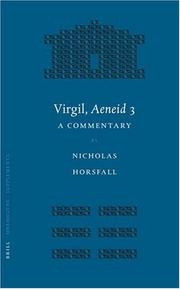
ISSN: 01698958 ISBN: 9004148280 9789004148284 9047418247 Year: 2006 Volume: 273 Publisher: Leiden, Netherlands ; Boston, [Massachusetts] : Brill,
Abstract | Keywords | Export | Availability | Bookmark
 Loading...
Loading...Choose an application
- Reference Manager
- EndNote
- RefWorks (Direct export to RefWorks)
This is the first detailed commentary on Aeneid 3, being some three times the size of that by R.D.Williams(1962), and aimed at the scholarly public. It treats fully the thorny problem of book 3's place in the growth of the poem, matters of linguistic and textual interpretation, metre, prosody, grammar, lexicon and idiom, as well as Virgil's sources and the literary tradition in which he writes. Full attention is given to matters geographical and nautical. New critical approaches and recent developments in Virgilian studies have been taken into account, with more attention to their spirit than to their language. A text, with translation, and three indices are included.
Aeneas (Legendary character) in literature. --- Epic poetry, Latin --- Enée (Personnage légendaire) dans la litterature --- Poésie épique latine --- History and criticism. --- Histoire et critique --- Virgil. --- Enée (Personnage légendaire) dans la litterature --- Poésie épique latine --- Aeneas (Legendary character) in literature --- History and criticism --- Aeneas --- In literature. --- Vergilius Maro, Publius --- Αἰνείας --- Aineias --- Enéas --- Эней --- Ėneĭ --- Еней --- Eneja --- Enees --- Eneo --- Énée --- Aeinéas --- Enea --- Enejs --- Enėjas --- Aineiasz --- アイネイアース --- Aineiāsu --- Eneasz --- Ajnejas --- Eneias --- Енеја --- Aeneis --- 埃涅阿斯 --- Ainieasi --- Vergilius Maro, P. --- Virgil --- Vergilius --- Vergil --- Virgile --- Virgilius Maro, Publius --- Marone, Publio Virgilio --- Virgilio Máron, Publio --- Vergili Maronis, Publius --- Virgilio Marone, P. --- Vergilīĭ --- Vergílio --- Wergiliusz --- Vergilīĭ Maron, P. --- Vergilīĭ Maron, Publīĭ --- Verhiliĭ Maron, P. --- Virgilio --- Virgilīĭ, --- Virgilius Maro, P. --- Virgil Maro, P. --- ווירגיל, --- וירגיליוס, --- ורגיליוס, --- מרו, פובליוס ורגיליוס, --- فرجيل, --- Pseudo-Virgil --- Pseudo Virgilio --- Virgilio Marón, Publio --- Bhārjila
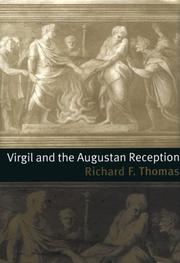
ISBN: 1107120810 1280432632 0511177194 0511046340 0511158130 051148240X 0511329962 0511016506 9780511016509 0511031092 9780511031090 9780511482403 9780511046346 9780521782883 0521782880 9780511158131 9781107120815 9781280432637 9780511177194 9780511329968 9780521028950 0521028957 Year: 2006 Publisher: Cambridge: Cambridge university press,
Abstract | Keywords | Export | Availability | Bookmark
 Loading...
Loading...Choose an application
- Reference Manager
- EndNote
- RefWorks (Direct export to RefWorks)
This book is an examination of the ideological reception of Virgil at specific moments in the last two millennia. The author focuses on the emperor Augustus in the poetry of Virgil, detects in the poets and grammarians of antiquity alternately a collaborative oppositional reading and an attempt to suppress such reading, studies creative translation (particularly Dryden's), which reasserts the 'Augustan' Virgil, and examines naive translation which can be truer to the spirit of Virgil. Scrutiny of 'textual cleansing', philology's rewriting or excision of troubling readings, leads to readings by both supporters and opponents of fascism and National Socialism to support or subvert the latter-day Augustus. The book ends with a diachronic examination of the ways successive ages have tried to make the Aeneid conform to their upbeat expectations of this poet.
Latin poetry --- Latin language --- Classical languages --- Italic languages and dialects --- Classical philology --- Latin philology --- Latin literature --- History and criticism --- Theory, etc. --- Translating into English. --- Virgil --- Augustus, --- Vergilius Maro, P. --- Vergilius Maro, Publius --- Vergilius --- Vergil --- Virgile --- Virgilio Máron, Publio --- Virgilius Maro, Publius --- Vergili Maronis, Publius --- Virgilio Marone, P. --- Vergilīĭ --- Vergílio --- Wergiliusz --- Vergilīĭ Maron, P. --- Vergilīĭ Maron, Publīĭ --- Verhiliĭ Maron, P. --- Virgilio --- Virgilīĭ, --- Virgilius Maro, P. --- Virgil Maro, P. --- ווירגיל, --- וירגיליוס, --- ורגיליוס, --- מרו, פובליוס ורגיליוס, --- فرجيل, --- Pseudo-Virgil --- Pseudo Virgilio --- Virgilio Marón, Publio --- Bhārjila --- Octavius Caesar, --- Gaius Octavius, --- Octavius, Gaius, --- Octavianus, --- Octavianus, Gaius Julius Caesar, --- Gaius Julius Caesar Octavianus, --- Octavian, --- Caius Julius Caesar Octavianus, --- T︠S︡ezarʹ Oktavian Avgust, --- Oktavian-Avgust, T︠S︡ezarʹ, --- Avgust, T︠S︡ezarʹ Oktavian, --- Octavianus Augustus, --- Augusto, --- Cesarz August, --- Ogusṭus, --- Augustus Caesar, --- Gaius Octavius Thurinus, --- Octavio Augusto, --- Cayo Octavio Turino, --- Thurinus, Gaius Octavius, --- Turino, Cayo Octavio, --- אוגוסטוס --- Criticism and interpretation --- History. --- In literature. --- Influence. --- Translations into English --- History and criticism. --- Appreciation --- Rome --- Translating into English --- History and criticism&delete& --- Theory, etc --- Reader-response criticism --- Fascism and literature --- Poésie latine --- Esthétique de la réception --- Fascisme et littérature --- Histoire et critique --- Rome dans la littérature --- In literature --- Arts and Humanities --- History --- Influence --- Augustus --- England --- Rome in literature --- Marone, Publio Virgilio --- Latin poetry - History and criticism - Theory, etc. --- Latin language - Translating into English --- Virgil - Criticism and interpretation - History --- Virgil - Appreciation - Great Britain --- Augustus, - Emperor of Rome, - 63 B.C.-14 A.D. - In literature --- Augustus, - Emperor of Rome, - 63 B.C.-14 A.D. - Influence --- Virgil - Translations into English - History and criticism --- Augustus, - Emperor of Rome, - 63 B.C.-14 A.D.
| Listing 1 - 5 of 5 |
Sort by
|

 Search
Search Feedback
Feedback About UniCat
About UniCat  Help
Help News
News